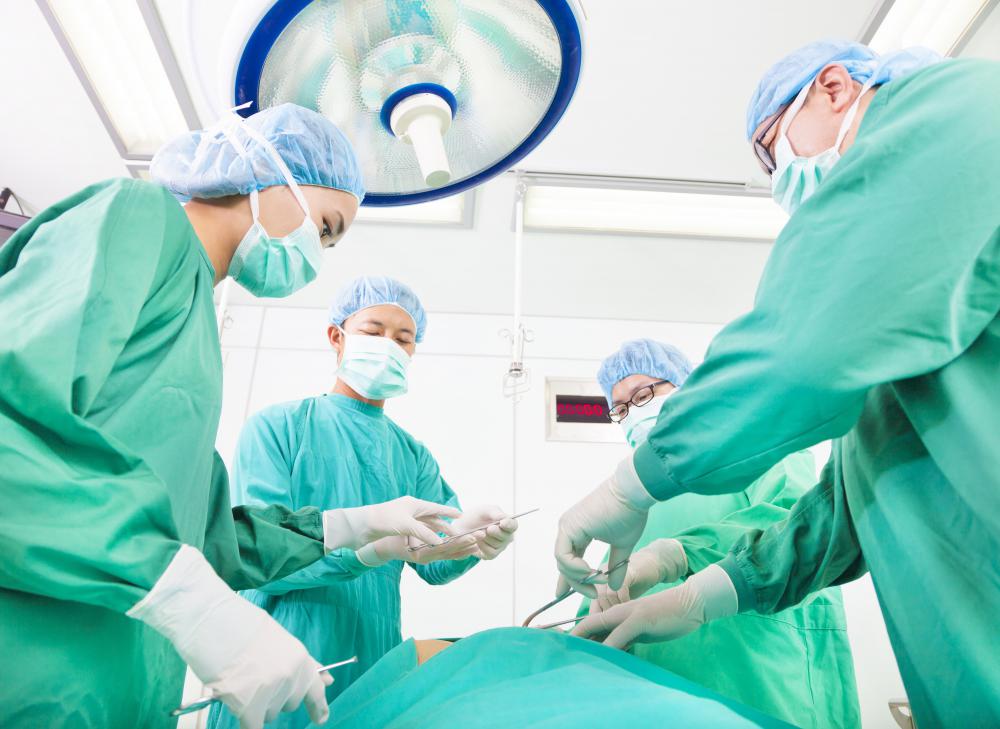At WiseGEEK, we're committed to delivering accurate, trustworthy information. Our expert-authored content is rigorously fact-checked and sourced from credible authorities. Discover how we uphold the highest standards in providing you with reliable knowledge.
What are the Most Common Symptoms of a Strangulated Hernia?
A strangulated hernia is characterized by intense pain and sensitivity at the site of the hernia. Individuals suffering from this condition are also likely to experience difficulties having a bowel movement or may be completely unable to have one as long as the hernia is present. Other symptoms of this kind of hernia may include fever, nausea and vomiting.
When a person is stricken by a hernia, an internal organ has actually begun to protrude beyond the wall that normally separates it from other parts of the body. Often, such a protrusion occurs in the area of the groin as part of a person’s intestine attempts to push past the abdominal wall. The symptoms of a strangulated hernia, in particular, are caused by the hernia constricting the blood flow in the intestines and sometimes completely blocking the blood supply in this region. When this occurs, a patient will feel severe pain and the area of the hernia’s location will be very sensitive to the touch.

Also known as an irreducible hernia, another sign of this condition may be the onset of gangrene. This is due to a lack of blood supply in the area of the hernia, which results in tissue that begins to die if the condition is not promptly treated. Individuals with this specific type of hernia are also likely to possess a visible bulge in the groin area. Treating this type of hernia as quickly as possible is crucial, as irreversible tissue damage and infections associated with damaged tissue may also occur.

This kind of hernia most commonly occurs in men. While such is a rare occurrence in women, a femoral hernia, which is a hernia that occurs in the femoral canal, can turn into a strangulated hernia in a woman if not properly treated before progressing. One of the most common signs of this type of hernia is a bulge in the upper thigh area.
Often, a strangulated hernia will begin as an inguinal hernia. While engaging in heavy lifting, this type of hernia may be felt in the groin area, but is sometimes undetected, as it may exist while being completely painless. When a bulge is detected, an inguinal hernia may be pushed back into place. When such is possible, this type is considered to be a reducible hernia. When it cannot be pushed back into place, however, it is known as an irreducible hernia and painful symptoms are usually felt.
AS FEATURED ON:
AS FEATURED ON:

















Discussion Comments
@irontoenail - Actually, it's more common in people who are obese, just because the membranes are under more stress.
It can also be common in people who have not been eating properly, just because their whole body will be functioning less well. But I think generally, going on a diet (but maintaining nutrition) or exercising will lower your chances of getting a hernia, not raise them.
Also, I'm pretty sure that most strangulated hernias occur from the kind of hernia that's obvious.
My father had that kind (although he got it repaired before it was strangulated) and he had a very obvious bulge, even though it wasn't really painful.
@bythewell - Unfortunately, not every hernia presents as something obvious. Sometimes the more severe symptoms of a strangulated hernia are the first time someone realizes they even have a hernia.
I know people who, for example, have lost some weight through exercise and got used to having small aches and pains all the time, and didn't realize they'd had a hernia until they did a checkup. And other people simply didn't have an obvious symptom.
Apparently it's more common to get hernias in people who have lost weight, just because of the body membranes being thinned out.
Often a strangulated hernia happens because a normal hernia goes untreated for too long and eventually gets tangled up in other parts of the body.
I know that sometimes hernias aren't that painful and it might not seem all that urgent to get them treated, but they can develop into something serious really quickly and without warning.
And you really don't want to be suffering from gangrene in your intestines. Believe me, not only would that be incredibly painful, but it might also lead to important parts of you being cut out to save your life.
Or possibly you might not be saved at all.
A hernia repair operation is quick and easy, and I think people should get it done as quickly as they can if they realize they have a hernia.
Post your comments